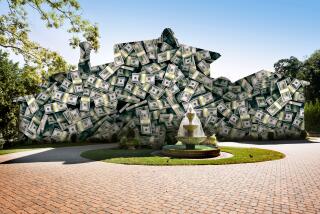Cities, States Are Piling On Rental Car Taxes
- Share via
Every time you rent a car at Dallas/Fort Worth International Airport, you are paying a tax that helps reduce local property taxes in Euless, Texas, the airport’s home city. You are also paying for new NHL and NBA arenas.
Renting a car in Charlotte, N.C.? Your taxes go to fund a downtown arts center. In Milwaukee, the latest municipality to increase car rental taxes, where is the money going? Toward a study to make recommendations about local mass transit options.
All told, 83 state and local governments since 1976 have instituted some form of rental car tax on top of any sales or vehicle licensing taxes, according to the National Business Travel Assn.
Where does this tax money end up? Public projects and studies of all kinds, but currently these local taxes are being used or proposed to finance 35 stadiums and convention centers around the country.
Anyone who has ever rented a car knows that by the time the taxes, fees and insurance the car rental agencies try to sell are added into the final cost, the advertised rate can easily double.
And though consumers can avoid the unnecessary insurance, taxes are another matter entirely.
Texas has the highest taxes. In 1997, then-Gov. George W. Bush signed legislation allowing local governments to raise funds for sports venues by imposing rental car taxes.
According to a 2005 study by Internet travel agency Travelocity, Texas has four of the top 10 airports with the largest difference between base rate and final total price.
By contrast, California had the lowest taxes, with seven of its airports ranking in the top 10 for lowest difference.
For example, renting a car at Dallas-Fort Worth will cost more than 60% over the base rate in taxes and fees; at Houston’s Bush Intercontinental, 66%.
To get a dollars-and-cents perspective, I did a comparison of what it would cost to rent an economy car for three days at Dallas-Fort Worth versus what it would cost at Los Angeles International Airport, where renters pay only the standard sales tax.
When I checked last week, for instance, Payless offered a base rate of $61 to rent a Hyundai Accent for three days at LAX. A similar car at DFW went for $57 for three days.
But when taxes were added in, the LAX car cost $66; the DFW car, $93. That’s a $27 difference, or 41% more for the same type of car.
“We’re not opposed to car renters paying their fair share,” said Bill Connors, executive director of the business travel association. His group lobbies state and federal officials on issues of importance to business travelers.
But in the localities that have instituted such taxes, the average tax rate is 26%, he said. “That’s higher than [for] handguns, alcohol and tobacco.... And we don’t think business travel is a sin.”
New taxes are under consideration in at least 24 states, according to a study by economists William Gale and Kim Rueben commissioned by Enterprise Rent-A-Car Co.
The taxes have become popular with cash-strapped municipalities because the perception is that the taxes are paid by tourists or business travelers and not by local residents.
But that perception is misleading, according to the Gale-Rueben study. The majority of customers rent cars at off-airport sites, and the vast majority of those customers are locals.
Even local companies are affected by the taxes.
“It is companies that have their headquarters in those cities that are paying for those high taxes,” said Carol Devine, director of strategic sourcing for Fort Worth-based BNSF Railway Co.
The numbers add up. In Milwaukee, a $2 fee is expected to generate $800,000 a year -- just to fund a report. In Euless, the 5% tax on rental cars generated $10.7 million in 2005.
Euless splits the tax revenue with the cities of Dallas and Fort Worth, keeping $3.5 million -- about 4% of its annual budget.
In all, the business travel association estimates that these taxes have cost consumers and companies more than $3 billion since they were first instituted.
In some locations, the taxes are a fixed amount per day. In Kansas City, Mo., for example, it is $4 a day, regardless of the cost of the car.
The fee has driven car rental customers over the border to Kansas City, Kan., just to avoid the tax, according to Gale and Rueben. They contend that such taxes are in effect higher on lower-priced cars.
So what’s a business traveler to do? You have to go where you have to go, regardless of the taxes. But there are some things that individuals, companies and meeting planners can do to mitigate these tax costs.
Consider renting from an off-airport location. Many airports carry higher fees that can be reduced by renting off site (14.1% versus 25.8% at airports, according to Travelocity). But there aren’t always savings. I compared renting at DFW with renting at a downtown Dallas hotel Hertz location. The higher base rate downtown more than offset any potential tax savings. But it is worth investigating.
Companies at high-tax locations can share their concerns with local elected officials, letting them know that the burden of the taxes is falling disproportionately on local businesses.
Meeting and convention planners can ask that companies vying for their business make known all the special local taxes, including rental car and hotel taxes, that are being piled on top of normal taxes. The business travel association is planning on asking for that information in deciding where it will hold its national conference (which in 2006 had more than 5,000 attendees) in the future, said Executive Director Connors.
“Three years ago it was a nuisance,” he said. “But now it’s the No. 1 traveler complaint.”
*
James Gilden can be reached at james.gilden@latimes.com.
More to Read
Inside the business of entertainment
The Wide Shot brings you news, analysis and insights on everything from streaming wars to production — and what it all means for the future.
You may occasionally receive promotional content from the Los Angeles Times.










